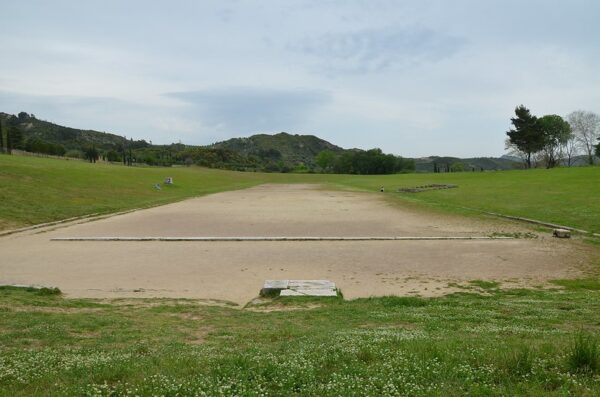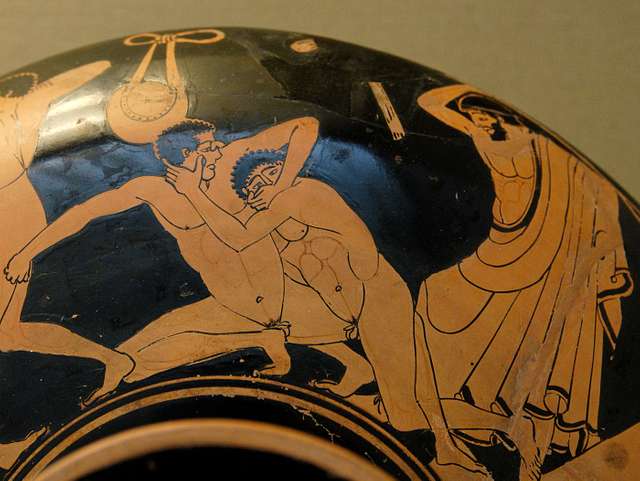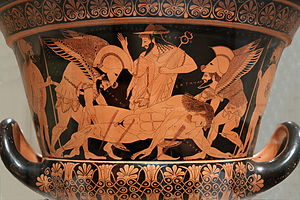The ancient Olympics were a pinnacle of physical performance but twinned with this need to succeed was something less noble, cheating. Perhaps it shouldn’t be that much of a shock – in Homer’s Iliad the chariot race at the funeral games for Patroclus has Menelaus seething at what he percieved was an illegal move made against him by Antilochus.
Moving from the fictional to the real we have instances of cheating at the prestigious games at Olympia. Pausanias, in his many travels, noted a particular statue at Olympia which he commented would unnerve criminals. This was of Zeus in his capacity of overseeing oaths – it was here that not only athletes but the fathers, brothers and even their trainers would swear an oath to keep to the rules of the games and do no wrong. Athletes would also swear that they had been in training for ten months and officials would also swear to keep things fair.
What’s implied in taking an oath where you promise that you will not break the rules is that rules were broken. At Olympia a series of bronze statues of Zeus stood and these were funded through fines paid for exactly that type of behaviour. The earliest of these statues, known as zanes, dated to 398 BC. The question therefore is, what type of cheating was going on?
If you want to listen to much more about how the ancient Olympics began and what happened check out my Ancient Olympics podcast episode and you can also read about how Batman competed in them (yes, this happened).
“Judge not lest ye be judged”.
The games at Olympia required all sorts of officials, from those checking that athletes were in the correct age category (both human and equine) through to judging the actual events. In the context of age allocation, we can understand how difficult this might be. The actual method of classification is difficult to unwrap (see Petermandl in the reading list) but we might all remember that kid we grew up with who towered above everyone else. Convincing anyone that such an individual belonged in a younger age category might be tricky. However, it might help if you had someone like a king to vouch for you. According to both Xenophon and the later Plutarch the Spartan King Agesilaos helped get a friend’s son, who was very tall for his age, into the stadium race at Olympia in the younger category. Though this was an instance of a fair outcome you can imagine that there must have been older athletes looking to seize an advantage by entering in the younger categories. Perhaps the ‘he’s just big for his age’ wasn’t always genuine.
Judges, or hellanodikai, were an obvious point of failure. In 396 BC a runner named Eupolemos participated in the stadion, a footrace. Two of the three judges at the finish line declared him the winner, with the other declaring that another runner named Leon had won. This was challenged by Leon, and he took this to appeal. Leon was successful and the two judges who had declared him the winner were fined.

Bribery at the Olympics.
This was the most common mechanism to facilitate cheating. Those statues set up in 398 BC from the fines resulted from exactly this. A boxer named Eupolis had bribed three opponents and all four were fined and hence the statues. Interestingly this information was carried through inscriptions which named and shamed as well as point out the errors of their ways.
On a similar theme but very much escalated, was Kallippos of Athens. In 332 BC he was found to have bribed his opponents in the pentathlon. Rather than accept the fine the city state of Athens stepped in and refused to pay and were only persuaded to when the Oracle at Delphi refused to give any more oracles to them.

Moving home.
The instance with Kallippos reminds us how a victory for an athlete at Olympia was also one for their home city. This was no small thing and city states might be tempted to persuade an athlete to reconsider their citizenship.
I’ll start with Astylos, a highly regarded athlete from Croton in southern Italy. He was an accomplished runner, winning in three successive games (488, 484, and 480BC). However, the last two victories were as a Syracusan. Hieron, the tyrant of Syracuse had persuaded him to change cities. As you might expect his original home city of Croton took this badly. A statue of him (presumably celebrating that first win) was destroyed and his house in Croton was turned into a prison.
Unpopular in Croton as he was it would be plausible for Astylos to return there. Perhaps not advisable though. When another runner called Sotades won a footrace in 384 BC he did so as a runner from Crete. By the time of the next games, he was announced as an Ephesian (i.e. from Ephesus). Crete promptly exiled him.
Bribery in this context didn’t always work. Dionysius I of Syracuse attempted to convince Kleinopater to have his son enter the boxing as a Syracusan and not as a Milesian (from Miletus). In case you are wondering why the father was involved here, well this was the boy’s boxing competition. Boxing (or pyx) was introduced in 688 BC and a brutal event. There were no rounds, boxers wore strips of leather round their hands and injuries were a given.
As mentioned boxing was a very dangerous event and in 496 BC Kleomedes was disqualified after he killed an opponent. The death itself doesn’t seem to have been the issue, the implication was that he cheated in some way. Deaths did occur at the games, the chariot races offering the most risk but many of these events, particularly boxing and the pankration, were savage affairs. I’ll try and finish on an upbeat, albeit morbid, example. In one pankration at the games in 564 BC Arrichion won after dislocating his opponents ankle and forcing him to submit. However, Arrichion had been put in a stranglehold and was dead by the time his opponent tapped out. He was still awarded the win though.
Ancient Olympics reading list
Pausanias (section on Olympia)
Miller, S. Arete.
Petermandl, W. Age-categories in Greek Athletic Contests.



